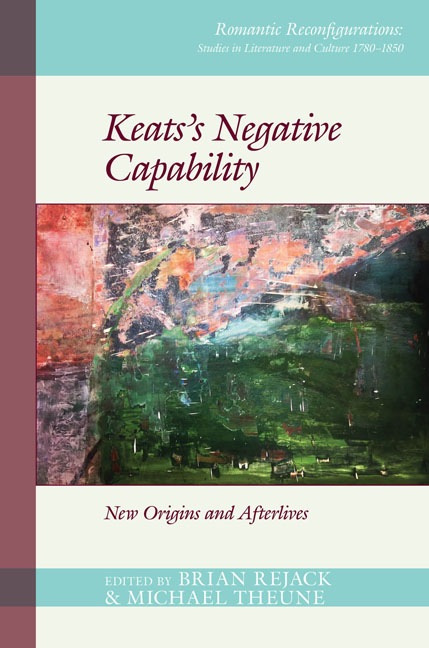Book contents
- Frontmatter
- Contents
- List of Figures
- Acknowledgments
- List of Abbreviations
- List of Contributors
- Preface
- Introduction: Disquisitions: Reading Negative Capability, 1817–2017
- Part I ‘swelling into reality’: New Contexts for Negative Capability
- Part II ‘examplified throughout’: Forms of Negatively Capable Reading
- Part III ‘pursued through Volumes’, Volume I: Negative Capability in Twentieth- and Twenty-First-Century American Poetry
- Part IV ‘pursued through Volumes’, Volume II: Adaptations, Appropriations, Mutations
- Afterword: Reading Keats's Negative Capability
- Bibliography
- Index
4 - ‘that strong excepted soul’: Nineteenth-Century Women Read Keats
- Frontmatter
- Contents
- List of Figures
- Acknowledgments
- List of Abbreviations
- List of Contributors
- Preface
- Introduction: Disquisitions: Reading Negative Capability, 1817–2017
- Part I ‘swelling into reality’: New Contexts for Negative Capability
- Part II ‘examplified throughout’: Forms of Negatively Capable Reading
- Part III ‘pursued through Volumes’, Volume I: Negative Capability in Twentieth- and Twenty-First-Century American Poetry
- Part IV ‘pursued through Volumes’, Volume II: Adaptations, Appropriations, Mutations
- Afterword: Reading Keats's Negative Capability
- Bibliography
- Index
Summary
Introduction
This chapter explores early nineteenth-century women readers of Keats, whose reflections on the poet's life and achievements characterize the gap between his 1821 death and the publication and wider circulation of his letters. The women, Elizabeth Barrett Browning, Letitia Elizabeth Landon, and, to a lesser extent, Mary Shelley, provide an archive of critical perspectives on Keats’s legacy and early reception that both challenges and reinforces the by-nowcanonical accounts of his male contemporaries—Percy Shelley's Adonais, Leigh Hunt's ‘Cockney School’ of poetry, and Lord Byron's derogatory praise—as well as later views. Like their counterparts, the women tend to be laudatory but condescending. Rather than identify with the poet on the grounds of shared social inferiority, as has been suggested, they generally treat him with respectful pity. Indeed, at a time when being female and taken seriously as a thinker could have meant expressly not equating beauty with authority (as Mary Wollstonecraft warned, ‘it is the fate of the fairest flowers to be admired and pulled to pieces by the careless hand that plucked them’), these writers, who appreciate and were influenced by Keats, are also wont to distance themselves from his perceived effeminacy and weakness. This tension, between approbation on the one hand and detachment on the other, typifies the admiring resistance of Keats's reception by the women authors: an attitude with which they judge poems and a poet as-yet-uncharacterized by explicit knowledge of ‘Negative Capability’ (LJK, I: p. 193).
Exploring this attitude in letters, poems, and diary entries, I ask if Keats’s reception by nineteenth-century women pre-figures more recent alliances (both implied and forged) between negative capability and uniquely ‘female’ ways of knowing. The question is not a simple one. As Susan Wolfson puts it, Keats's poetry is ‘as complex and elusive in its gender as it is compelling in its genius’, unsettling gender binaries whilst ‘provok[ing] [the] terminology— masculine, feminine, effeminate, patriarchal, feminist’.3 For Wolfson, as for Anne Mellor, Marjorie Levinson, Margaret Homans, and James Najarian, Keats's poetry resists stable categorization by enacting shifts in gender that tie pleasure to uncertainty. The poet ‘embodies an aspect of the feminine within masculinity itself’ and, as Najarian argues, for nineteenth-century male readers this ambiguity courts a variety of queer identifications (p. 20).
- Type
- Chapter
- Information
- Keats's Negative CapabilityNew Origins and Afterlives, pp. 60 - 76Publisher: Liverpool University PressPrint publication year: 2019



